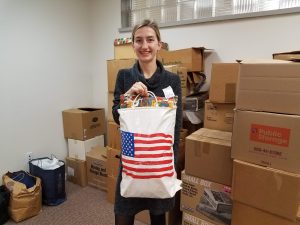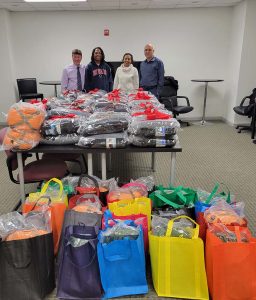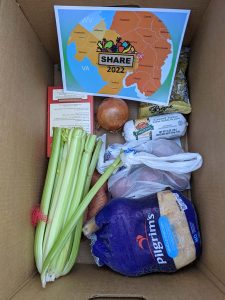Imagine a world where you have to choose: medicine, food, heat, or clothes. Money is scarce, so you have to be a wizard at budgeting, and many times you don’t have enough money for everything you need so you have to make difficult decisions about what is most important to buy.
That world is in Ukraine, where winter lasts until March and sometimes April. Winter starts in October, and it can get bitterly cold (-4*F) and you typically get about 20 inches of snow. Extreme weather for an extended period of time!
In Ukraine, the minimum salary in the country is just over $200 per month, but in villages the minimum salary is only about $100, which is very different from the U.S. For those on pension, they receive about $60 per month. Working mothers, for example, have to decide if they can afford wood to keep their children warm. A load of wood costs $200-300, and you have to cut it up yourself. Facing situations like this, it is difficult to make ends meet.
Many houses are small and rustic. The kitchen is the central room of the house, and it has a pechka stove, which is a large wood cooking stove that has a sleeping area above it. In these types of houses, the children sleep huddled together above the stove to stay warm overnight. Because money is tight, people don’t have a lot of clothes, and the clothes they do have are old and worn out.
There is a second-hand store in Kyiv. People who stay in town can take a bus to the store after work and shop for clothes, but they have to make sure they can carry their purchases on the bus back to their rented room.
Because salaries are so low in villages, many people have taken work in the city of Kyiv (Kiev). They are not able to go home to their village every night because the bus ride takes three hours, one way, and involves a bus transfer and the cost for transportation is high so they rent a room in the city and then visit their village and stay with relatives once or twice a month. Many working moms leave their children with the grandparents and then rent a room in Kyiv and only get home to see their children once or twice a month.
There is a problem with buying clothes from the thrift store, though. The store uses strong chemicals that make the clothes smell nasty, and it is extremely difficult to get the smell out. Sometimes, even after washing the clothes multiple times, the horrible smell is still there, but they wear it anyway because that’s all they have.
Because wages are low, many people cannot afford to buy clothes, even second-hand, and because fewer people can afford clothes, the clothes have less variety and cost more. However, sometimes their clothes are so worn that they are forced to buy clothes. While people in the U.S. may pay $30 for a pair of jeans, the U.S. salary is higher so Americans can afford the clothes. When someone in Ukraine pays $30 for a pair of jeans, they probably won’t be able to buy food for a month.
Family units often include multiple generations. Grandparents often watch their grandchildren, so parents can work. For many people on pension in Ukraine, the cost of one pair of jeans and a shirt is equivalent to their monthly pension! Even by combining pensions and salaries, families have to decide whether to buy medicine or food.
Hi. My name is Olga, and I’m from Ukraine. I understand the abject poverty that surrounded me growing up. This story is about my neighbors and how I helped them.
When I emigrated to the United States, I wanted to make a difference. I knew a big impact I could have would be to provide clothes for my neighbors, something they need but cannot afford. Elderly people and those in hospitals have greater difficulty meeting their needs. The smiles on their faces and tears of joy in their eyes when they received clothes was priceless!
I noticed that Americans are accustomed to making donations. It seemed logical that if people were going to donate clothes, they might donate them to my cause. I put out a call to my coworkers, asking for donations.
Another reason why I chose clothing donations is that in Ukraine, cultural pride says that you need to work for money, and this prevents people from accepting monetary donations. But if you give them clothes, they will accept that.
Through the generosity of my colleagues, this year I collected 13 boxes of clothes. IBSS helped with shipping costs and also donated clothes. If I had to pay for the shipping by myself, I would only have been able to send 5 boxes. I arranged to have the boxes picked up from my house and then they were put on a freighter and shipped to Ukraine. It took about two months for them to travel overseas.
Because my mom still lives in Ukraine, the boxes were delivered directly to her house and then she was able to distribute the clothes. One man came to my mom’s house to pick up clothes for himself and others in his village, and he brought a sled to make it easier to take clothes back for everyone. My mom also took several boxes of clothes to a hospital and to a local church.
By accepting donated clothes, people can keep their pension or salary for food, medicine, and wood for heating. Many people walked to my mom’s house through snow and bitter cold because they needed clothes so badly. One man rode his bicycle over snow-covered roads to make it easier to carry clothes back to his village.
People are grateful because clothes from the U.S. are higher quality than what is available in Ukraine. Some of my coworkers bought clothes from a thrift store here in the U.S. and donated them to my cause, and even those clothes are nicer than those available in Ukraine. Young adults often do not have appropriate clothes to go to university, where they can learn skills to help them get good-paying jobs. Other people can’t get jobs because they do not have the right kind of clothes to wear to work. Many of the donations provided clothes that will allow people to go to school or work.
Many children are seriously impacted by poverty and often their clothes are very old and falling apart. I especially like it when my coworkers donate children’s clothes because those keep giving. Once a child outgrows the clothes, the clothes will be donated to another child, and then another child after that.
The men, women, and children who received these clothes have not had any “new” clothes in years. The clothes they do have are old and worn. Many of the people don’t have enough clothes to keep them warm during the harsh, long winters. By collecting and shipping clothes, then having my mom distribute them, I know that the help is going directly to my neighbors, who will have decent, warm clothes that will last for years.
We have sent clothes a couple of other times as well. So far, we have been able to help more than 120 people, not just by giving them clothes but by assisting them during hard times!
I am grateful to IBSS and my coworkers. Our joint efforts helped others in a tangible way.









